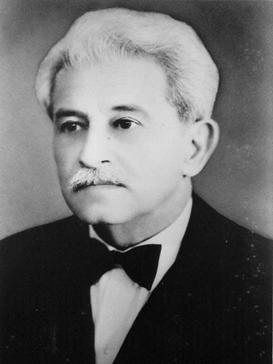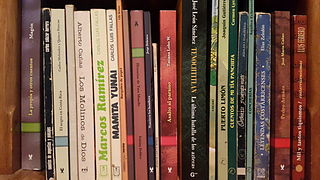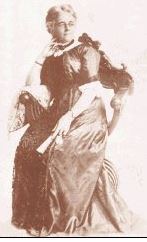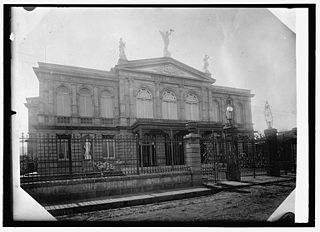
Rodrigo José Ramón Francisco de Jesús Carazo Odio served as President of Costa Rica from 8 May 1978 to 8 May 1982.

General José Federico Alberto de Jesús Tinoco Granados was a politician, soldier, and the Dictator of Costa Rica from 1917 to 1919.

Joaquín Gutiérrez Mangel was a Costa Rican writer who won multiple awards, and whose children's book Cocorí has been translated into ten languages. In addition to writing children's books, Gutiérrez was a chess champion, war correspondent, journalist, story-teller, translator, professor, and communist activist.

José María Vicente Esteban Rafael de Jesús Calderón Muñoz, known as Rafael Calderón Muñoz was a Costa Rican politician and physician. He is cited as "one of the leaders of a circle of Catholic politicians with social concerns". Calderón Muñoz was vice president from 1940 until his death.
Alberto Cañas Escalante was a politician, writer, intellectual, public servant, and journalist from San José, Costa Rica. He is known as one of the most important figures in the cultural, political, and social life of Costa Rica during the latter half of the twentieth century. The National Library System of Costa Rica credits Cañas with more than 4,773 publications as of 2005.

Jorge Rossi Chavarría was a Costa Rican politician. He was a lawyer, businessman. He co-founded the National Liberation Party (PLN) with Jose Figueres. He was Vice President of Costa Rica from 1970 to 1974 and representative from 1986 to 1990.

Costa Rican literature has roots in colonization and is marked by European influences. Because Costa Rica is a young country, its literary tradition is also young. The history of Costa Rican literature dates to the end of the 19th century.

Manuel Aguilar Chacón was head of state of Costa Rica from April 1837 to March 1838.
Joaquín Mora Fernández was the provisional head of state of Costa Rica from 1 March to 17 April 1837.

Jorge Antonio Salas Bonilla is a Costa Rican lawyer and politician. He was mayor of Tibás between 2007 and 2011.
Hernán Solano Venegas is a Costa Rican politician and the first Vice-Minister of Youth and current Minister of Sport. In addition, Solano was the president of the Costa Rican Cycling Federation. He is from Pérez Zeledón.
Trade unions in Costa Rica advocate for the rights of workers in Costa Rica. Dating back to the late 1800s, labor unions in the country have been a political force. They remain active in political and social life for many Costa Ricans.

Marian Le Cappellain (1851–1923) was a British teacher who established one of the first secondary schools available for girls' education in Costa Rica.

María Fernández de Tinoco was a Costa Rican writer and amateur archaeologist who became the First Lady of Costa Rica in 1917. Educated in England, Fernández studied archaeology, art and music before returning to Costa Rica. Involved in amateur archaeological digs and charitable works, she wrote articles for publication in local newspapers and magazines and published two novels. When her husband staged a coup d'état and was later elected President of Costa Rica, she served as First Lady from 8 June 1917 to 20 August 1919. When he resigned from his post due to mismanagement, the couple moved to Paris, where she participated in archeological and artistic works until his death in 1931. From 1932 to 1934, she resided in Norway before returning to Costa Rica, where she resumed her archeological studies and publishing, while working for the National Museum of Costa Rica. Involved with the Red Cross, she was awarded the Florence Nightingale Medal in 1949 and in 2012, the Ministry of Culture of Costa Rica produced a documentary about her life.
Elena Gallegos Rosales was the Salvadoran-born wife of the 24th President of Costa Rica. During her tenure as first lady, she was responsible for furnishing and establishing the new Presidential House, performing charitable works, and accompanying her husband on various diplomatic trips.

Joaquín Mariano de Oreamuno was a Costa Rican who led a coup in 1823 that attempted to make Costa Rica part of the First Mexican Empire. A few days later the imperialist forces were defeated by republicans under Gregorio José Ramírez in the Battle of Ochomogo.

Liberalism in Costa Rica is a political philosophy with a long and complex history. Liberals were the hegemonic political group for most of Costa Rica's history especially during the periods of the Free State and the First Republic, however, as the liberal model exhausted itself and new more left-wing reformist movements clashed during the Costa Rican Civil War liberalism was relegated to a secondary role after the Second Costa Rican Republic with the development of Costa Rica's Welfare State and its two-party system controlled by social-democratic and Christian democratic parties.

The Liberal State is the historical period in Costa Rica that occurred approximately between 1870 and 1940. It responded to the hegemonic dominion in the political, ideological and economic aspects of liberal philosophy. It is considered a period of transcendental importance in Costa Rican history, as it's when the consolidation of the National State and its institutions finally takes place.

Julieta Dobles Yzaguirre is a Costa Rican poet, writer, and educator. She is a five-time winner of the Aquileo J. Echeverría Award and received the Magón National Prize for Culture in 2013.

The Theosophical Society in Costa Rica was the local branch of the world Theosophical Society based in Adyar, India. It was founded on March 27, 1904 in the city of San José, and like Freemasonry in Costa Rica, it was the first in Central America, 1 it was introduced by the Spanish painter based in Costa Rica Tomás Povedano who began in Spanish theosophy. Its first lodge or branch was the Virya Branch, which published a magazine of the same name, currently it has four branches or lodges; Virya, Shakti Lodge, Dharma Lodge and HPB.















